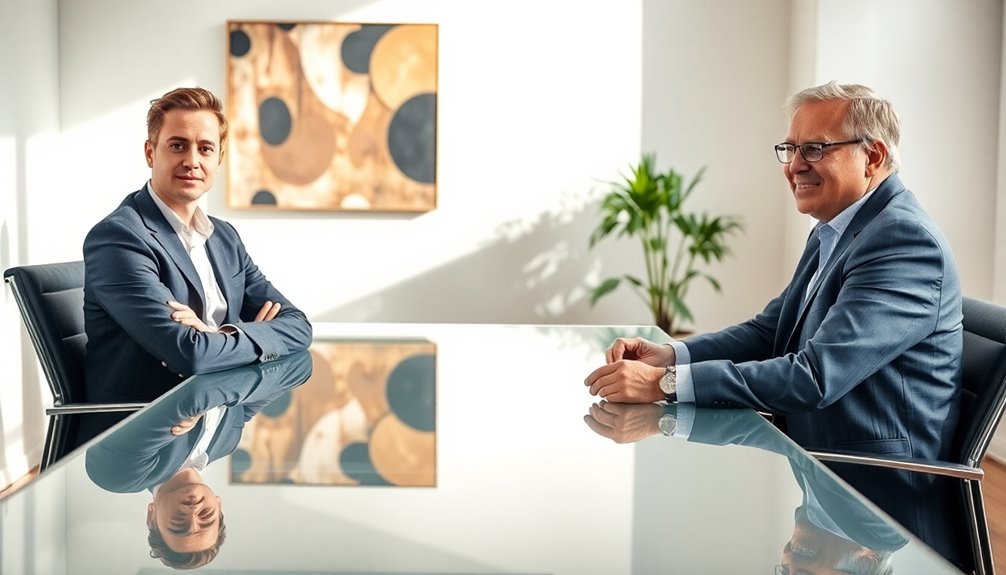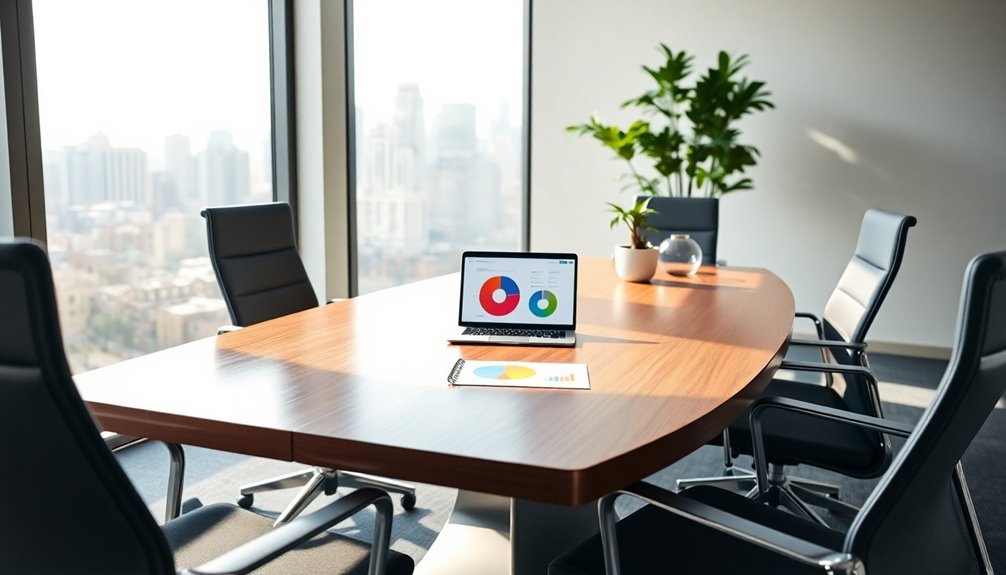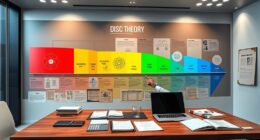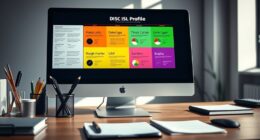Mastering communication skills in interviews is essential for making a lasting impression. You need to actively listen, paraphrase, and ask clarifying questions to show understanding. Understanding the organization's culture helps you tailor your responses and questions effectively. Use a positive tone and maintain confident body language to convey your enthusiasm. Empathy builds rapport with interviewers, enhancing your chances of connecting. Being concise prevents confusion and shows your ability to communicate clearly. By honing these skills, you can greatly increase your chances of securing that job. There's more to explore on how communication can transform your interview experience.
Key Takeaways
- Practice active listening to fully understand interview questions and respond appropriately.
- Use paraphrasing and clarifying questions to ensure you grasp the interviewer's intent.
- Demonstrate empathy to build rapport and connect with the interviewer on a personal level.
- Maintain a positive tone and confident body language to enhance your message's impact.
- Tailor your communication style to align with the organization's culture for better fit.
Importance of Communication Skills

When you're preparing for a job interview, understanding the importance of communication skills can't be overstated. These skills are essential for showcasing your qualifications and ensuring that you align with the role's requirements.
If you're applying for a client-facing position, effective communication becomes even more critical, as it can directly influence customer satisfaction and sales outcomes. Your ability to resolve customer issues swiftly and clearly can demonstrate your competence to potential employers.
During the interview, remember that employers will assess how well your communication style matches their organizational culture. This alignment can enhance your chances of landing the job, as it indicates your readiness to contribute positively to the team and the company's overall goals.
Understanding Organizational Culture

Understanding organizational culture is essential for both candidates and employers during the hiring process. It shapes how you'll fit into the team and how the company operates. By grasping the culture, you can tailor your communication and demonstrate your alignment with the organization's values.
- Assess the leadership's stance on communication.
- Observe if openness and honesty are valued.
- Evaluate how feedback is given and received.
- Identify if collaboration is encouraged or stifled.
- Gauge if the environment supports innovation or rigidity.
This understanding not only helps you present yourself effectively but also allows you to ask insightful questions that show your interest in the company's culture.
Ultimately, it guarantees a more mutual fit for both you and the employer.
Effective Communication Techniques

Effective communication techniques can greatly enhance your performance in interviews and workplace interactions.
Start by practicing active listening; this means really focusing on what the interviewer or colleague is saying. Use paraphrasing and clarifying questions to guarantee understanding. Show empathy by acknowledging their feelings or concerns—this builds rapport and trust.
When responding, be concise and stick to the main points to avoid confusion. Don't hesitate to ask for clarification if something isn't clear; it demonstrates your commitment to effective communication.
Additionally, maintain a positive tone and body language, as these non-verbal cues considerably impact how your message is received.
Communication in Team Settings

Mastering communication techniques not only enhances your individual performance but is also essential in team settings.
Clear and effective communication can greatly improve collaboration, ensuring everyone's on the same page.
Here are some key strategies to keep in mind:
- Foster an open environment where team members feel comfortable sharing ideas.
- Utilize active listening to truly understand your teammates' perspectives.
- Encourage feedback to enhance processes and develop solutions collaboratively.
- Schedule regular check-ins to keep everyone aligned and informed.
- Be concise and clear to minimize misunderstandings and confusion.
Additional Resources and Articles

To explore communication skills further, you can immerse yourself in a variety of additional resources and articles designed to enhance your understanding and application of these concepts. These materials can provide you with valuable insights and practical strategies for improving your communication during interviews, including the importance of personalized learning to adapt your approach to different interviewers.
| Resource Type | Description | Link |
|---|---|---|
| Career Guides | Explore various career paths and skills needed. | [Career Guide](#) |
| Resume Writing Tips | Learn best practices for writing effective resumes. | [Resume Tips](#) |
| Communication Techniques | Discover strategies to improve your interview communication. | [Techniques](#) |
Utilizing these resources will give you a competitive edge, ensuring you're well-prepared to showcase your communication skills effectively.
Frequently Asked Questions
How Can I Improve My Communication Skills Before an Interview?
To improve your communication skills before an interview, practice active listening by engaging in conversations and asking clarifying questions.
Role-play with a friend to simulate interview scenarios and refine your responses.
Record yourself speaking to identify areas for improvement, like tone and clarity.
Read widely to expand your vocabulary and understanding of different communication styles.
Finally, seek feedback from others to gain insights into your strengths and areas that need work.
What Common Mistakes Should I Avoid When Communicating in Interviews?
When it comes to interviews, avoiding communication blunders is essential. You don't want to sound like a robot reciting lines!
Steer clear of vague answers, excessive jargon, and interrupting the interviewer. Practice active listening, making eye contact, and maintaining a confident posture.
Don't forget to tailor your responses to reflect the company's culture. Remember, clarity and authenticity are your best friends, so let your personality shine through without overwhelming your audience!
How Do Body Language and Non-Verbal Cues Impact Communication?
Body language and non-verbal cues greatly impact communication by conveying emotions and intentions that words alone can't express.
When you maintain eye contact, smile, and use open gestures, you show confidence and engagement. Conversely, crossed arms or lack of eye contact can signal defensiveness or disinterest.
You should be aware of your posture and facial expressions, as they can reinforce or contradict your spoken message, influencing how others perceive you.
What Role Does Confidence Play in Effective Communication During Interviews?
Confidence plays an essential role in effective communication. When you're confident, you convey your message clearly and assertively, making it easier for others to understand you. This self-assurance helps you engage in conversations, listen actively, and respond thoughtfully.
Plus, confident body language, like maintaining eye contact and using open gestures, reinforces your words. Ultimately, your confidence not only enhances your communication but also influences how others perceive your competence and credibility.
How Can I Practice Active Listening in Interview Settings?
Did you know that 85% of communication is nonverbal?
To practice active listening in interviews, focus on the speaker's body language and tone. Nod occasionally to show engagement, and paraphrase their points to confirm understanding.
Ask clarifying questions to dive deeper into their thoughts. This not only demonstrates your attentiveness but also fosters a genuine connection, making you stand out as a candidate who values effective communication.
Conclusion
To sum up, cultivating clear and confident communication can greatly shape your interview success. By embracing effective engagement, understanding organizational culture, and showcasing your skills, you'll not only stand out but also strengthen your connection with potential employers. Remember, mastering these methods enhances your ability to convey competence and charisma, creating compelling conversations that captivate hiring managers. So, prepare diligently and practice persistently, and you'll radiate readiness and resilience in every interview encounter.
Eugene brings a fresh, dynamic voice to our platform as one of our talented Writers. Specializing in research-driven content, he explores the latest findings in psychology and personal growth, translating them into actionable insights for our readers. Eugene’s work is fueled by a curiosity about what makes us tick and a desire to help others unlock their potential.










